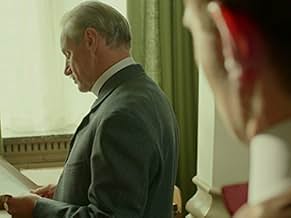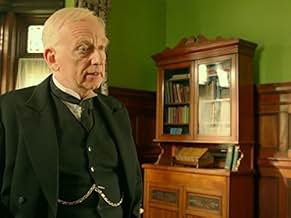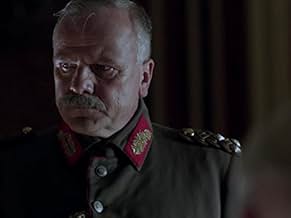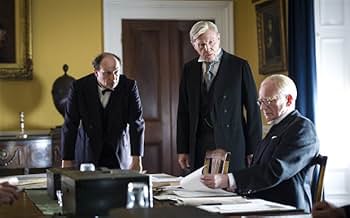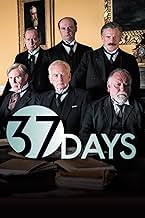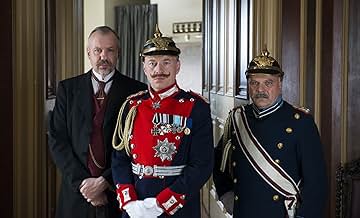37 Days
- Minissérie de televisão
- 2014
- 1 h
AVALIAÇÃO DA IMDb
8,1/10
1,6 mil
SUA AVALIAÇÃO
Adicionar um enredo no seu idiomaA TV mini-series that unveils the behind-closed-doors story of the final weeks before the outbreak of World War I.A TV mini-series that unveils the behind-closed-doors story of the final weeks before the outbreak of World War I.A TV mini-series that unveils the behind-closed-doors story of the final weeks before the outbreak of World War I.
- Prêmios
- 1 indicação no total
Explorar episódios
Avaliações em destaque
Having read some of the other reviews on "37 Days" I am not sure whether it is a great series about historical facts or a great series about historical events as seen from the ultimate winners' point of view. Suffice to say, it is a great entertainment if you like that sort of genre.
Personally, I thoroughly enjoyed it (but then it is my sort of movie) as I enjoyed "Elizabeth, The Golden Age" and "The Other Boleyn Girl" although I honestly have very little idea as to the historical accuracy of any of them. Having so said, one has to presume that SOME historical accuracy had to be present otherwise the whole thing would have been nothing more than a fantasy movie about a fictional war (or, to be more correct, the events leading up to one) and that, it clearly wasn't.
I suppose the reason that I like this type of movie is because it has (at least, some) bearing on how the world got to be where it is today and, to that end, I'm sure that "37 Days" has sufficient accuracy to preclude it from being a parody. Other reviewers have commented, for example, on the inaccuracy of the portrayal of Czar Nicholas and, whilst I have no doubt that they write from a much better knowledge of the facts than I possess, it doesn't make the story as presented any less entertaining. Which raises the question, "Is this a film loosely based on historical events or is it a documentary?" and the answer to that makes all the difference in the world on how you view it.
I have rated the "37 Days" trilogy much the same as I rated Peter Jackson's "Lord of the Rings" trilogy which is on entertainment value and, in turn, makes me wonder how much relevance historical accuracy and artists' license have on rating entertainment value. To put that another way, when portraying events that actually happened, should historical accuracy be an essential facet? Because "37 Days" occurred much more recently in a time when journalistic reporting was far better developed and records much more prolific than a few hundred years earlier writers and directors have many, many more "facts" that they can draw upon than they had, for example, when making "Braveheart" or "Troy" so that history buffs (who also have those records) are able to vilify them for every little inaccuracy. That is sad because, in the end, unless they ARE documentaries, movies are made for entertainment and caricaturisation of characters simply adds to that entertainment. If they are caricatured to the point of absurdity, then the movie is a comedy or even a farce (a genre that I sadly note IMDb still doesn't have) and the entertainment value takes on a somewhat different complexion - but it's still entertainment!
Perhaps, by way of illustrating the point, another much-loved BBC TV series, "Heartbeat" - which is all fiction based around a historically factual police force set in Yorkshire in the early 1960s - often shows scenes that include railway trains. Those scenes are filmed at the North Yorkshire Moors Railway which is an enthusiast-run heritage steam railway where locomotives that never ran anywhere near Yorkshire are preserved in working order. So, because I happen to be a railway enthusiast, I COULD bemoan the absolutely prototypical inaccuracy of a Southern Railway S15 class steam engine pulling into Aidensfield station but what would be the point? Rather, I joyfully thank the enthusiasts who made the shooting of such scenes possible at all!
So, whilst I thank all those other reviewers who have educated me, fortunately, that education hasn't spoiled my enjoyment of "37 Days" one bit! I hope it will be available on DVD soon> I'll buy it.
On the story line, the only puzzling aspect for me was why on earth Britain felt any compunction to support France - a nation that had been a traditional enemy of theirs for centuries. I seemed to me that, had Britain simply acted as an observer, Germany wouldn't have had any reason to attack them as the disagreements were all continental. Also, it was really great that the story ended before America got involved and we were subjected to all the "swagger" that would have been associated with that!
Personally, I thoroughly enjoyed it (but then it is my sort of movie) as I enjoyed "Elizabeth, The Golden Age" and "The Other Boleyn Girl" although I honestly have very little idea as to the historical accuracy of any of them. Having so said, one has to presume that SOME historical accuracy had to be present otherwise the whole thing would have been nothing more than a fantasy movie about a fictional war (or, to be more correct, the events leading up to one) and that, it clearly wasn't.
I suppose the reason that I like this type of movie is because it has (at least, some) bearing on how the world got to be where it is today and, to that end, I'm sure that "37 Days" has sufficient accuracy to preclude it from being a parody. Other reviewers have commented, for example, on the inaccuracy of the portrayal of Czar Nicholas and, whilst I have no doubt that they write from a much better knowledge of the facts than I possess, it doesn't make the story as presented any less entertaining. Which raises the question, "Is this a film loosely based on historical events or is it a documentary?" and the answer to that makes all the difference in the world on how you view it.
I have rated the "37 Days" trilogy much the same as I rated Peter Jackson's "Lord of the Rings" trilogy which is on entertainment value and, in turn, makes me wonder how much relevance historical accuracy and artists' license have on rating entertainment value. To put that another way, when portraying events that actually happened, should historical accuracy be an essential facet? Because "37 Days" occurred much more recently in a time when journalistic reporting was far better developed and records much more prolific than a few hundred years earlier writers and directors have many, many more "facts" that they can draw upon than they had, for example, when making "Braveheart" or "Troy" so that history buffs (who also have those records) are able to vilify them for every little inaccuracy. That is sad because, in the end, unless they ARE documentaries, movies are made for entertainment and caricaturisation of characters simply adds to that entertainment. If they are caricatured to the point of absurdity, then the movie is a comedy or even a farce (a genre that I sadly note IMDb still doesn't have) and the entertainment value takes on a somewhat different complexion - but it's still entertainment!
Perhaps, by way of illustrating the point, another much-loved BBC TV series, "Heartbeat" - which is all fiction based around a historically factual police force set in Yorkshire in the early 1960s - often shows scenes that include railway trains. Those scenes are filmed at the North Yorkshire Moors Railway which is an enthusiast-run heritage steam railway where locomotives that never ran anywhere near Yorkshire are preserved in working order. So, because I happen to be a railway enthusiast, I COULD bemoan the absolutely prototypical inaccuracy of a Southern Railway S15 class steam engine pulling into Aidensfield station but what would be the point? Rather, I joyfully thank the enthusiasts who made the shooting of such scenes possible at all!
So, whilst I thank all those other reviewers who have educated me, fortunately, that education hasn't spoiled my enjoyment of "37 Days" one bit! I hope it will be available on DVD soon> I'll buy it.
On the story line, the only puzzling aspect for me was why on earth Britain felt any compunction to support France - a nation that had been a traditional enemy of theirs for centuries. I seemed to me that, had Britain simply acted as an observer, Germany wouldn't have had any reason to attack them as the disagreements were all continental. Also, it was really great that the story ended before America got involved and we were subjected to all the "swagger" that would have been associated with that!
Talk about a fly on the wall! I was absolutely spellbound, and to just think that I was privy to the inner meetings that led up to this great disaster. The acting was superb, and although, I couldn't say whether the parts were played with accuracy, they were certainly played with an intelligence and real life perfection that would have put German high command to shame.
And this is why I was transformed into a fly. The script, the accessible truth of this fascinating situation, the acting – cor blimey. I'll be watching it again tomorrow.
And this is why I was transformed into a fly. The script, the accessible truth of this fascinating situation, the acting – cor blimey. I'll be watching it again tomorrow.
Intriguing and educational.
A dramatisation of the events that lead to World War 1, and, in particular, Britain's participation in the war. From the assassination of Archduke Franz Ferdinand on 28 June 1914 until Britain declared war on Germany on 4 August 1914 - 37 days - we see the diplomatic negotiations and behind-the-scenes machinations from many sides.
A well made telling of the diplomacy (and, ultimately, failure thereof) in the lead-up to World War 1. Had the potential to be quite dry, but there is always a fair amount of tension and intrigue present, even though you know how it is all going to end.
Quite educational too: there's plenty of movies about the fighting in wars, but not much about the diplomatic side. This makes 37 Days a bit of a rarity.
Also quite chilling, as you see how things escalate, and realise how the war could have been averted. You see how personalities and sometimes seemingly small events or discussions shape the outcome. Quite eye-opening.
A dramatisation of the events that lead to World War 1, and, in particular, Britain's participation in the war. From the assassination of Archduke Franz Ferdinand on 28 June 1914 until Britain declared war on Germany on 4 August 1914 - 37 days - we see the diplomatic negotiations and behind-the-scenes machinations from many sides.
A well made telling of the diplomacy (and, ultimately, failure thereof) in the lead-up to World War 1. Had the potential to be quite dry, but there is always a fair amount of tension and intrigue present, even though you know how it is all going to end.
Quite educational too: there's plenty of movies about the fighting in wars, but not much about the diplomatic side. This makes 37 Days a bit of a rarity.
Also quite chilling, as you see how things escalate, and realise how the war could have been averted. You see how personalities and sometimes seemingly small events or discussions shape the outcome. Quite eye-opening.
I admit some of the Geman characters were a bit one dimensional but I wouldn't be so hard on this series as others. I really enjoyed it and missed it when it ended. It was educational, informative and entertaining. I am a fan of history so I might be a bit biased I admit but it was right up my street.
It isn't meant to be a high-budget American blockbuster, but a serious look at a side of the First World War that usually gets little coverage. OK the odd bit of dialogue was less than authentic - but a darn sight more authentic than all the massive bloopers in Downton Abbey! We all know about the battles and the casualties, the assassination of Franz Ferdinand and the Treaty of Versailles, but it is politicians who make wars. Politicians and human frailties. This series focuses on the politicians involved and shows how we come to war by degree and mis-interpretation and not by some big event.
As stated, the performances by the actors playing the English characters were great - understated and probably accurate.
I learnt a lot. Perhaps an abridged version would be useful in schools so those studying GCSE History can see that there was more to it than 'a bloke getting shot in the Balkans'.
It isn't meant to be a high-budget American blockbuster, but a serious look at a side of the First World War that usually gets little coverage. OK the odd bit of dialogue was less than authentic - but a darn sight more authentic than all the massive bloopers in Downton Abbey! We all know about the battles and the casualties, the assassination of Franz Ferdinand and the Treaty of Versailles, but it is politicians who make wars. Politicians and human frailties. This series focuses on the politicians involved and shows how we come to war by degree and mis-interpretation and not by some big event.
As stated, the performances by the actors playing the English characters were great - understated and probably accurate.
I learnt a lot. Perhaps an abridged version would be useful in schools so those studying GCSE History can see that there was more to it than 'a bloke getting shot in the Balkans'.
37 Days is an informative, well-paced, even thrilling piece of historical drama with some superb performances from the best of the British. Its approach to the causes of the First World War is both entertaining and educational. However, there are some problems which prevent this mini-series from becoming a true classic.
The greatest problem is that almost all character who are not British are portrayed in a manner most cartoonish; from the German Kaiser to Austrian and French ambassadors all non-British characters are ridiculously over-the-top caricatures, more ludicrous than the characters in Oh! What a Lovely War. And Lovely War is a musical parody.
I can't but wonder why a production which pays so much attention to detail and is slavishly faithful to historical facts makes its characters look one-dimensional caricatures? Especially when all the British characters are portrayed as completely normal and there is true emotion and humanity in the scenes taking place in London. Is portraying the Continental characters as buffoons some kind of a statement or a lousy attempt at comedy by the British production team? In this respect 37 Days brings to mind the Nazi version of Titanic in 1943 where all the English characters are baddies and the German one saves the day. (Another point which bothers me is the portrayal of the last Russian tsar Nicholas II. In this he is shown as an aggressive and stern military man rather than the sensitive and simple family man portrayed in every single film and history book concerning this topic. Could it be that the production team has confused Nicholas II with his father Alexander III because the character in 37 Days truly looks and acts like Alexander?)
Nevertheless, 37 Days is a fresh take on the First World War and includes some wonderful performances. Absolutely phenomenal is Ian McDiarmid as Sir Edward Grey who truly brings realism and humanity to the production which is in places in a danger of becoming a parody because of its cartoonish cavalcade of Continental caricatures or a boring history lesson since all the scenes take place in cabinet meeting rooms. Other great performances are delivered by Bill Paterson, Sinéad Cusack, Nicholas Farrell and Tim Pigott-Smith, to name a few.
The greatest problem is that almost all character who are not British are portrayed in a manner most cartoonish; from the German Kaiser to Austrian and French ambassadors all non-British characters are ridiculously over-the-top caricatures, more ludicrous than the characters in Oh! What a Lovely War. And Lovely War is a musical parody.
I can't but wonder why a production which pays so much attention to detail and is slavishly faithful to historical facts makes its characters look one-dimensional caricatures? Especially when all the British characters are portrayed as completely normal and there is true emotion and humanity in the scenes taking place in London. Is portraying the Continental characters as buffoons some kind of a statement or a lousy attempt at comedy by the British production team? In this respect 37 Days brings to mind the Nazi version of Titanic in 1943 where all the English characters are baddies and the German one saves the day. (Another point which bothers me is the portrayal of the last Russian tsar Nicholas II. In this he is shown as an aggressive and stern military man rather than the sensitive and simple family man portrayed in every single film and history book concerning this topic. Could it be that the production team has confused Nicholas II with his father Alexander III because the character in 37 Days truly looks and acts like Alexander?)
Nevertheless, 37 Days is a fresh take on the First World War and includes some wonderful performances. Absolutely phenomenal is Ian McDiarmid as Sir Edward Grey who truly brings realism and humanity to the production which is in places in a danger of becoming a parody because of its cartoonish cavalcade of Continental caricatures or a boring history lesson since all the scenes take place in cabinet meeting rooms. Other great performances are delivered by Bill Paterson, Sinéad Cusack, Nicholas Farrell and Tim Pigott-Smith, to name a few.
Você sabia?
- CuriosidadesThe music received an RTS nomination for Andrew Simon McAllister.
- Erros de gravaçãoSir Edward Grey was only 52 years old at the time of the events depicted in the series, yet is played by a 70 year old Ian McDiarmid.
- ConexõesFeatured in The Wright Stuff: Episode #19.45 (2014)
Principais escolhas
Faça login para avaliar e ver a lista de recomendações personalizadas
- How many seasons does 37 Days have?Fornecido pela Alexa
Detalhes
- Tempo de duração
- 1 h(60 min)
- Cor
- Proporção
- 1.78 : 1
Contribua para esta página
Sugerir uma alteração ou adicionar conteúdo ausente

